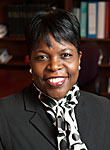Second phase of budget redesign kicks off
By Susan Kelley

The university's budget model may not be the sexiest topic on campus.
But it may be one of the most important. Upcoming decisions about how to retool the budget model will reverberate throughout Cornell for years to come.
"This may be the most significant thing I'm involved in during my term as provost," said Provost Kent Fuchs recently at the first meeting of the Budget Redesign Steering Committee. "Whatever good we create out of this process will have a long, enduring effect."
The committee's goal is to put in place the first set of redesign changes in time for fiscal year 2012 planning and to implement subsequent changes over time in conjunction with other administrative initiatives.
"Creating one model that is simpler, more transparent and more informed by data than the several unwieldy models the university currently uses will be a significant undertaking," said Vice President for Planning and Budget Elmira Mangum, who chairs the committee. "We want to manage the cost pressures of the current environment and at the same time improve administrative service and quality and academic excellence."
To do that, the committee will tackle some of the campus's toughest fiscal issues. How should tuition dollars be distributed among colleges when a student takes a class outside her major? Who owns the different buildings and spaces on campus? Who should pay for their use and upkeep? The committee will also suggest changes in how units such as facilities, information technology and communications charge other units for their services. And it will address how the administration can best recover institutional overheads and create a university support fund with which the provost can pay for universitywide priorities.
President David Skorton, Fuchs and Mangum will lead the budget redesign by setting the direction, providing guidance and making final decisions.
The steering committee is made up of four deans, four vice presidents, four college officers, Senior Vice Provost Ron Seeber, the budget director and the university auditor; Vice President for Student and Academic Services Susan Murphy is vice chair. Four subcommittees, with wide representation from across campus, will make recommendations on key issues.
Although the steering committee's work has just begun, the budget redesign project has been in the works for more than a year.
The first phase began in spring 2009, when Fuchs created the Budget Model Task Force (and 19 others) and charged them with making Cornell a leaner, stronger university by 2014.
In January, the Budget Model Task Force recommended high-level changes, from pooling undergraduate tuition to creating a provost's fund to pay for institutional priorities. It also defined the new model's principles: Budget decisions will be informed - but not driven - by data; the university will live within its means; spending will be as transparent as possible; policies will be flexible enough to manage the university's complexities; and administrative policies will be uniformly applicable and standardized.
The current phase, in which the steering committee will recommend policy changes and a timeline for their implementation, will include forums, brown-bag lunches and feedback sessions where the committee will talk about the changes with stakeholders and the campus community.
The third, final phase will begin in July 2012, with policies in effect.
"The most important outcome of this process, other than the obvious effectiveness and fairness, is a Cornell solution and a Cornell redesign that is in the best interest of the whole university in its reimagined state as one Cornell," Mangum said.
Get Cornell news delivered right to your inbox.
Subscribe